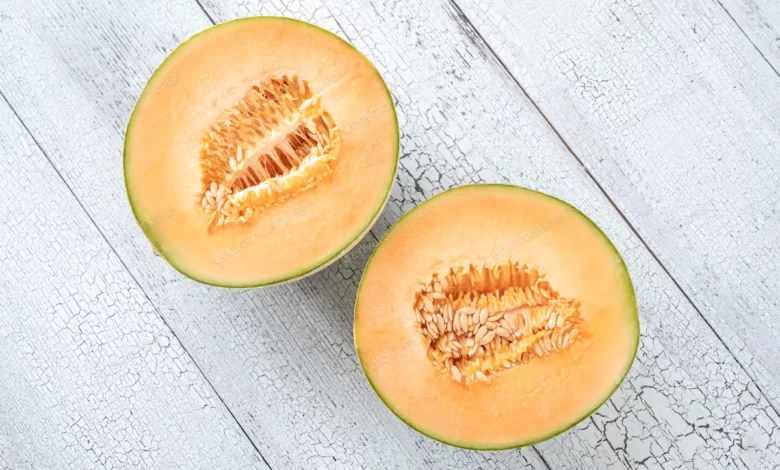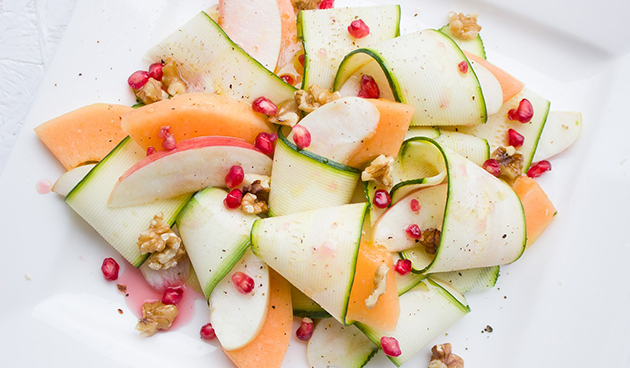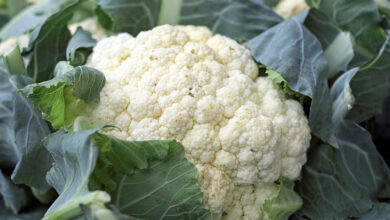Melon: health benefits and side effects

At the end of summer in Russia, the season of melons begins – these large yellow-orange fruits not only taste good but are also considered an indispensable source of vitamins and useful elements. “Komsomolskaya Pravda,” tells what the health benefits of melon are, in which case it can be harmful.
The History Of The Appearance Of Melon In Nutrition
Melon seeds were brought to Russia from Central Asia. But if we talk about the history of melon from the very beginning, then for the first time its taste was appreciated in ancient Egypt.
During the Renaissance, it was grown in the gardens of the Pope. The melon belongs to the gourd family (from the Persian “melon” garden, vegetable garden), which also includes watermelon, pumpkin, cucumbers, and other products known to us.
Health Benefits Of Melon
Melons have several health benefits, including:
- Hydration: Melons are high in water content and can help with hydration.
- Vitamin C: Melons are a good source of vitamin C, which helps boost the immune system and protect against infections.
- Antioxidants: Melons contain antioxidants like carotenoids and flavonoids that help protect the body against damage from free radicals.
- Potassium: Melons are a good source of potassium, which helps regulate blood pressure and support heart health.
- Digestion: Melons are low in fiber but contain enzymes that can aid digestion and promote a healthy gut.
- Skin health: The vitamin C in melons can help keep skin looking young and vibrant by supporting collagen production.
- Low calorie: Melons are low in calories, making them a good choice for people trying to maintain a healthy weight.
Antioxidant Effect
Melon is a rich source of vitamins A and C.
These vitamins are powerful antioxidants. They protect our body from free radicals that can damage DNA molecules and cause inflammatory reactions in the body, says Dr. Mangieri. —Moreover, antioxidants (vitamins A and C) can prevent the development of cancer, cardiovascular and other diseases.
Effect On The Heart And Blood Vessels
According to the Harvard School of Public Health T.H. Chana, eating a diet rich in fruits and vegetables is directly linked to a reduced risk of heart disease and stroke.

Influence On The Organs Of Vision
Eating more fruits and vegetables helps maintain visual acuity, and protects against the development of cataracts and macular degeneration, the two most common eye diseases that develop with age.
“Vitamin A, found in melon, is most beneficial for maintaining vision,” notes Dr. Mangieri.
Impact On Digestion
Melons have a number of impacts on digestion, including:
- Hydration: Melons are high in water content and can help keep the digestive system hydrated, which is important for proper digestion.
- Enzymes: Melons contain digestive enzymes like amylases and proteases, which can help break down food and improve the digestion process.
- Fiber: Melons are low in fiber, which can help reduce bloating and discomfort for people with digestive issues like irritable bowel syndrome (IBS).
- Low in fat: Melons are low in fat, which can be beneficial for people with digestive issues related to fat intolerance, such as those with inflammatory bowel disease (IBD).
- Anti-inflammatory: Some studies suggest that the antioxidants in melons, such as vitamin C and beta-carotene, have anti-inflammatory effects that can help improve digestion and reduce symptoms of digestive disorders like IBS and IBD.
However, it’s important to note that melons can also cause digestive issues for some people, especially those with acid reflux or other acid-related digestive issues, as they are naturally acidic.
| Squirrels | 1 g |
| Fats | 0 g |
| Carbohydrates | 14 g |
| calories | 54 kcal |
| Sodium | 26 mg |
| Vitamin A | 108% daily requirement |
| Cellulose | 1 g – 6% of the daily requirement |
| Calcium | 1% daily requirement |
| Iron | 2% daily requirement |
Melon Side Effects
While melons are generally considered to be healthy, there are some potential harms associated with consuming them, including:
- Allergic reactions: Some people may experience an allergic reaction after consuming melons, including symptoms like itching, hives, and difficulty breathing.
- Interactions with medications: Melons can interact with certain medications, such as blood-thinning drugs, and may increase the risk of bleeding.
- Acid reflux: Melons are naturally acidic, and consuming large amounts can worsen symptoms of acid reflux or heartburn in people with these conditions.
- Gastrointestinal issues: For some people, consuming melons can cause digestive issues like bloating, cramping, and diarrhea.
- Pesticides: Melons are often heavily treated with pesticides, so it’s important to wash them thoroughly before eating or choose organic varieties to minimize exposure to these chemicals.
It’s always a good idea to talk to your doctor or a healthcare professional before making any significant changes to your diet, especially if you have a health condition or are taking medications.

The use of melon in medicine
Melons have been used for medicinal purposes in various traditional and alternative medicine systems for centuries. Some potential uses of melons in medicine include:
- Hydration: Melons are high in water content, making them a good option for hydration in people who are dehydrated due to illness or other factors.
- Antioxidants: The antioxidants in melons, such as vitamin C and beta-carotene, have been shown to have anti-inflammatory and protective effects against various diseases, including heart disease, cancer, and neurological disorders.
- Digestive health: Melons contain digestive enzymes that can aid digestion and improve gut health. Some alternative medicine practitioners also use melons to help treat digestive issues like constipation, bloating, and indigestion.
- Skin health: The high vitamin C content in melons can help improve skin health by supporting collagen production and reducing the effects of sun damage.
- Blood pressure: Melons are a good source of potassium, which helps regulate blood pressure. Some studies suggest that consuming more potassium-rich foods, including melons, can help lower blood pressure and reduce the risk of heart disease.
It’s important to note that while melons may have potential health benefits, they should not be used as a substitute for conventional medical treatment or medications. It’s always best to talk to a healthcare professional before using melons for medicinal purposes.
The use of melon in cooking
Melon is most often used as an independent product. It is usually served between meals. The melon is dried and frozen. Preserves, jams, and marmalades are prepared, marinated, and also used in the form of juices, cocktails, and ice cream.
In Mediterranean countries, the pulp of the fruit can be served with ham or shrimp. In Italy, it is often consumed with cheeses such as mozzarella.
melon ice cream
An easy recipe for a hot summer day

| Melon | 250 g |
| Heavy cream (33% or more) | 250 g |
| Condensed milk | 100 g |
| sprig of mint | for decoration |
We remove the cream from the refrigerator to cool. At this time, we clean and cut the melon into small pieces. We send it to a blender and beat it until puree. Pour cold cream into a separate bowl, and beat them with a mixer until creamy. While continuing to beat, gradually add the condensed milk.
Combine whipped cream with melon puree, and mix gently. We shift it into an iron form, cover it with foil, and put it in the refrigerator for 7-8 hours. Then we lay out the finished ice cream in vases, decorated with mint leaves.
Salad with avocado and melon
Vitamin bomb in 10 minutes

| Melon | 150 g |
| ripe avocado | 1 PC. |
| large orange | 1 PC. |
| Mint | a few leaves |
| Salt, white pepper | taste |
| Sesame | ½ teaspoon |
| Olive oil | 30 ml |
Peel melon and avocado, and cut into large cubes. Peel the orange, get rid of white veins and films, and cut it into pieces. Combine the ingredients, season with olive oil, add sesame seeds, and mix. Serve garnished with mint leaves.
How to choose and store melon
Choosing a ripe melon can be tricky because we can’t see it from the inside.
Dr. Mangieri believes that the sweet taste of a melon depends on how fresh it is: the fresher the melon, the sweeter it is. Take a melon in your hands, and if it seems heavier than you expected, then it is ripe. A ripe melon has a special flavor and its rind is slightly pliable when pressed with the thumb.
If you happen to buy a melon that is not ripe enough, you can leave it to ripen at home for a few days. However, do not wash the melon until you are about to cut it. This prevents bacterial growth and premature spoilage of the product. Although the melon will become softer and juicier over time, it will not add sweetness, as it has already been plucked from the garden.
It will not be possible to store such a capricious fruit as a melon for a long time without special conditions. If there are no conditions for storing fruits in a cellar or basement, then it is better to immediately process them into jam or candied fruit.
Popular questions and answers
We have answered common questions from our readers about the health benefits of melon.
Can you eat melon at night?
There is no scientific proof that eating melons at night can be harmful to your health. But as per Ayurveda, consuming melon at night can cause irritable bowel syndrome and other digestive problems
Why is melon useful for women?
It contains a large amount of folic acid. It is useful for the nervous system, as well as during pregnancy, planning, and breastfeeding. Sucrose, glucose, and fructose, which are present in large quantities in melon, contribute to brain function and improve memory.
When is the best time to buy melons?
Despite the fact that yellow fruits have been flooding markets and supermarkets almost since the end of May, you should not rush into buying – most likely, such early melons were grown using chemicals, which means that they will not bring much benefit, and even for a bright taste not worth counting. The melon season in Russia is August-September, it is during this period that it is best to buy sunny fruits.
checkout other articles:




